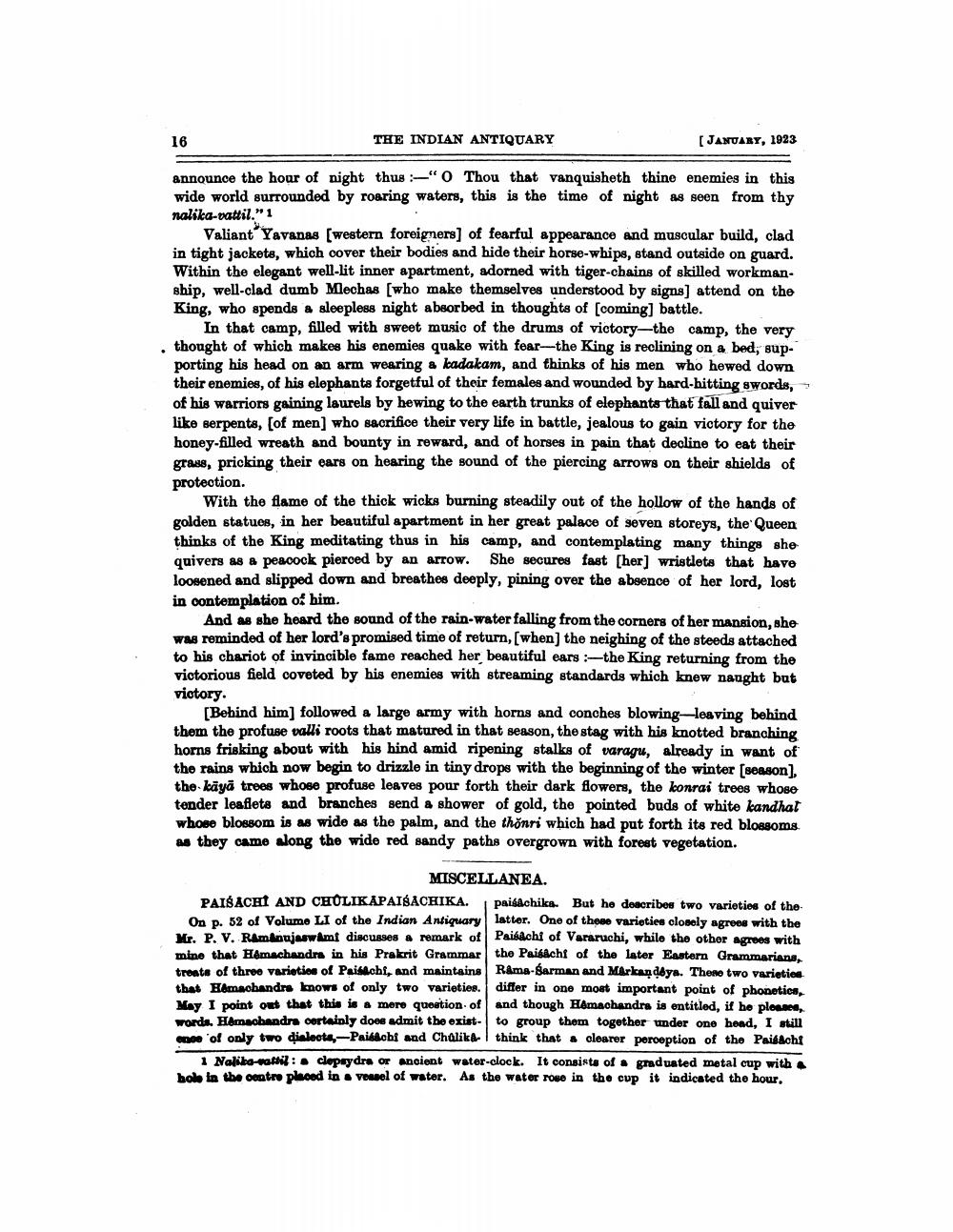________________
THE INDIAN ANTIQUARY
(JANUARY, 1923
announce the hour of night thus "O Thou that vanquisheth thine enemies in this wide world surrounded by roaring waters, this is the time of night as seen from thy nalika-vattil." 1
Valiant Yavanas (western foreigners) of fearful appearance and muscular build, clad in tight jackets, which cover their bodies and hide their horse-whips, stand outside on guard. Within the elegant well-lit inner apartment, adorned with tiger-chains of skilled workmanship. well-clad dumb Mechas (who make themselves understood by signs) attend on the King, who spends a sleepless night absorbed in thoughts of [coming] battle.
In that camp, filled with sweet music of the drums of victory-the camp, the very thought of which makes his enemies quake with fear-the King is reclining on a bed, supporting his head on an arm wearing a kadakam, and thinks of his men who hewed down their enemies, of his elephants forgetful of their females and wounded by hard-hitting swords, of his warriors gaining laurels by hewing to the earth trunks of elephants that fall and quiver like serpents, [of men) who sacrifice their very life in battle, jealous to gain victory for the honey-filled wreath and bounty in reward, and of horses in pain that decline to eat their grass, pricking their ears on hearing the sound of the piercing arrows on their shields of protection.
With the flame of the thick wicks burning steadily out of the hollow of the hands of golden statues, in her beautiful apartment in her great palace of seven storeys, the Queen thinks of the King meditating thus in his camp, and contemplating many things she quivers as & peacock pierced by an arrow. She secures fast [her] wristlets that have loosened and slipped down and breathes deeply, pining over the absence of her lord, lost in contemplation of him.
And as she heard the sound of the rain-water falling from the corners of her mansion, she Was reminded of her lord's promised time of return, (when) the neighing of the steeds attached to his chariot of invincible fame reached her beautiful ears the King returning from the victorious field coveted by his enemies with streaming standards which knew naught but victory.
(Behind him) followed a large army with horns and conches blowing-leaving behind them the profuse valli roots that matured in that season, the stag with his knotted branching horns frisking about with his hind amid ripening stalks of varagu, already in want of the rains which now begin to drizzle in tiny drops with the beginning of the winter (season) the kāyā trees whose profuse leaves pour forth their dark flowers, the konrai trees whose tender leaflets and branches send a shower of gold, the pointed buds of white kandhat whose blossom is as wide as the palm, and the thõnri which had put forth its red blossoms.
they came along the wide red sandy paths overgrown with forest vegetation.
MISCELLANEA. PAISACH AND CHOLIKAPAISACHIKA. paisachiks. But he describes two varieties of theOn . 52 of Volume LI of the Indian Antiquary latter. One of these varieties closely agrees with the W. P. V. Ramanujaswimf discusses a remark of Paisachi of Vararuchi, while the other agrees with mine that H&machandra in his Prakrit Grammar the Paisach of the later Eastern Grammarians, trents of three varieties of Paiflchi, and maintains Rama-Šarman and Markanddya. These two varieties that Hamachandra knows of only two varieties.differ in one most important point of phonetics, May I point out that this is a mere question of and though Hamachandra is entitled, if he plossen, worde. Hamachandra cortainly does admit the exist-to group them together under one head, I still noe of only two dialoote, --Paislobf and Chalika-l think that « clearer perception of the Paibach
1 Nalika-attil:. clepsydra or ancient water-clock. It consists of graduated metal cup with hole in the contre placed in . vennel of water. As the water rose in the cup it indicated the hour.




